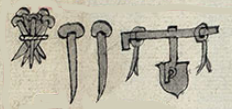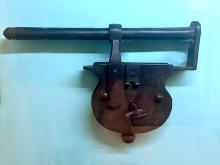tepoztli (CST2)
This painting of the simplex glyph for objects of metal (tepoztli), probably iron in this case, comes from a page dated 1551 of the Códice Sierra-Texupan. This may actually be several glyphs in one, but they are grouped and labeled in the text as though one. The group appears to include a tied group of small nails, possibly two large nails, and a group of three items (keys?) hanging from a bar or rack. The companion texts speak of chests and locks, which would support the presence of keys. The contextualizing image shows that the price for these metal objects was 29 pesos, a large expenditure. They seem to be a type of technology that was introduced by Europeans.
Stephanie Wood
In this larger digital collection, the most numerous representations of metal objects are axes/hatchets–most often just called tepoztli–plus bells (coyolli, oyohualli, tlatzilini, etc.), or coins (tomin, peso, teocuitlatl). For metal objects in the Codex Sierra, see also our entry for tepoztlatlapoloni. For more on the Codex Sierra, see Kevin Terraciano’s study (2021).
Stephanie Wood
1550–1564
Jeff Haskett-Wood
metales, objetos, tecnología, cajas, herramientas, llaves, cierres
The signage for this museum piece refers to this piece as a candado. It is from the seventeenth century. Museum of the city of Guadalajara. Photo by S. Wood, 15 April 2025.

tepoz(tli), metal, https://nahuatl.wired-humanities.org/content/tepoztli
metales
Stephanie Wood
Codex Sierra-Texupan, plate 2, page dated 1551. Origin: Santa Catalina Texupan, Mixteca Alta, State of Oaxaca. Kevin Terraciano has published an outstanding study of this manuscript (Codex Sierra, 2021), and in his book he refers to alphabetic and “pictorial” writing, not hieroglyphic writing. We are still counting some of the imagery from this source as hieroglyphic writing, but we are also including examples of “iconography” where the images verge on European style illustrations or scenes showing activities. We have this iconography category so that such images can be fruitfully compared with hieroglyphs. Hieroglyphic writing was evolving as a result of the influence of European illustrations, and even alphabetic writing impacted it. https://bidilaf.buap.mx/objeto.xql?id=48281&busqueda=Texupan&action=search
The Biblioteca Digital Lafragua of the Biblioteca Histórica José María Lafragua in Puebla, Mexico, publishes this Códice Sierra-Texupan, 1550–1564 (62pp., 30.7 x 21.8 cm.), referring to it as being in the “Public Domain.” This image is published here under a Creative Commons license, asking that you cite the Biblioteca Digital Lafragua and this Visual Lexicon of Aztec Hieroglyphs.







